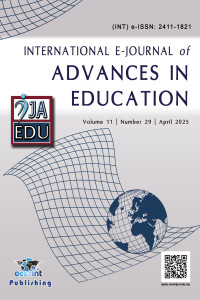DEVELOPING EFL STUDENTS' ACADEMIC LISTENING SKILLS ENHANCES THEIR SELF-EFFICACY AND ACADEMIC PERFORMANCE IN UZBEKISTAN
Abstract
This study investigates the effectiveness of improving academic listening skills among English as a Foreign Language (EFL) students from Turkmenistan who are enrolled in educational institutions in Uzbekistan, encountering both linguistic and non-linguistic challenges that obstruct proficient listening. In consideration of the substantial challenges these students face, which include limited language proficiency, cultural divergences, and variations in personal learning styles, this study delineates the primary obstacles to their academic achievement.
Subsequently, a comprehensive intervention treatment plan was devised over a four-month period, employing a task-oriented methodology that incorporates interactive activities, collaborative projects, and targeted feedback specifically aimed at enhancing listening abilities while addressing these challenges. A pivotal component of this methodology involved the formulation and evaluation of an experimental English literature curriculum and Integrated Language Skills curriculum, which integrated listening comprehension as a fundamental aspect to facilitate students' understanding of the subject matter, concurrently fostering critical listening skills through the examination of literary works and discussions. Additionally, the intervention placed a significant emphasis on metacognitive strategies by motivating students to contemplate their listening processes, establish objectives, and assess their comprehension, thereby promoting heightened self-regulation in their educational endeavors.
Moreover, a dedicated Google Classroom platform was established to provide students access to a variety of lecture resources, encompassing collected listening lectures and audio materials (YouTube videos), as well as practice assessments designed to promote autonomous learning and the enhancement of these competencies beyond the classroom setting. This digital platform offers students the opportunity to engage with listening input materials at their individual pace, thus reinforcing the skills acquired throughout the program.
The results reveal that participants within the treatment group exhibited notable advancements in their academic self-efficacy and overall academic performance in comparison to their counterparts in the control group. This outcome underscores the necessity of addressing listening challenges within the framework of English as a Foreign Language instruction and illustrates how improved listening capabilities can serve as a pathway to enhanced academic success.
The ramifications of this research extend beyond individual advantages, proposing that a heightened focus on task-based methodologies and metacognitive strategies for the development of listening skills within language education could yield improved academic outcomes for EFL learners at large. Consequently, this investigation bears practical implications for educators and curriculum developers by advocating for the establishment of more inclusive and effective language learning environments, with a concentrated emphasis on the cultivation of listening skills as central to EFL education. The amalgamation of an experimental English literature course, complemented by a meticulously designed online platform and metacognitive training, has the potential to significantly elevate students' capacity to practice and refine their listening skills, thereby facilitating progress toward academic accomplishment.
Keywords
listening comprehension self-efficacy task-based approach academic performance metacognitive strategies
References
- Bashirli, Y. (2024). Formation of students’ listening-comprehension skills in teaching english from a linguodidactic perspective. Bulletin of Postgraduate Education (Series), 29(58), 24–39. https://doi.org/10.58442/3041-1831-2024-29(58)-24-39
- English Language Unit, Preparatory Studies Center, University of Technology and Applied Sciences, Salalah, Sultanate of Oman., & Eragamreddy, Dr. N. (2024). The Integration of Listening Skills into Curriculum. International Journal of Current Science Research and Review, 07(11). https://doi.org/10.47191/ijcsrr/V7-i11-20
- Flowerdew, J., & Miller, L. (1997). The teaching of academic listening comprehension and the question of authenticity. English for Specific Purposes, 16(1), 27–46. https://doi.org/10.1016/S0889-4906(96)00030-0
- Khodjakulova, N., & Miceikiene, A. (2024). The Effectiveness of Environmental Sustainability in the Development of Teacher Creativity and Student Engagement Skills. E3S Web of Conferences, 574, 07004. https://doi.org/10.1051/e3sconf/202457407004
- Khodjakulova Nargiza Khosiyatkulovna. (2024). THE ROLE OF TEACHERS IN DEVELOPING TOURISM STUDENTS’ CRITICAL LISTENING SKILLS. https://doi.org/10.5281/ZENODO.11085184
- Mukhtorova, M., & Ilxomov, X. (2024). HOW TO IMPROVE LISTENING SKILLS OF BOTH ESL AND EFL STUDENTS. QO‘QON UNIVERSITETI XABARNOMASI, 11, 84–86. https://doi.org/10.54613/ku.v11i11.964
- Samatova Barnokhon Ravshankhanovna, & Nargiza Khosiyatkulovna Khodjakulova. (2024). THE DISTINCTIVE CHARACTERISTICS OF LISTENING COMPREHENSION IN A FOREIGN LANGUAGE. https://doi.org/10.5281/ZENODO.14198745
- Sharif, S., Ahmad, N., Pow Yean, C., Shaharuddin, G. S., & Tung Er, C. (2024). Exploring Listening Strategies in Language Learning. International Journal of Academic Research in Business and Social Sciences, 14(7), Pages 65-81. https://doi.org/10.6007/IJARBSS/v14-i7/21707
- Vandergrift, L. (1999). Facilitating second language listening comprehension: Acquiring successful strategies. ELT Journal, 53(3), 168–176. https://doi.org/10.1093/elt/53.3.168
- Vandergrift, L. (2003). Orchestrating Strategy Use: Toward a Model of the Skilled Second Language Listener. Language Learning, 53(3), 463–496. https://doi.org/10.1111/1467-9922.00232
Details
| Primary Language | English |
|---|---|
| Subjects | Communication Education |
| Journal Section | Articles |
| Authors | |
| Early Pub Date | April 29, 2025 |
| Publication Date | April 30, 2025 |
| Submission Date | February 17, 2025 |
| Acceptance Date | February 27, 2025 |
| Published in Issue | Year 2025Volume: 11 Issue: 29 |
Published and Sponsored by OCERINT International © 2015 - 2025
Contact: ijaedujournal@hotmail.com
International E-Journal of Advances in Education by IJAEDU is licensed under a Creative Commons Attribution-NonCommercial 4.0 International License. Permissions beyond the scope of this license may be available at http://ijaedu.ocerintjournals.org



